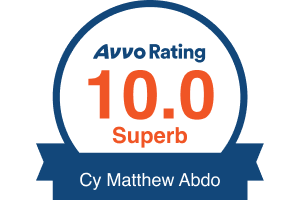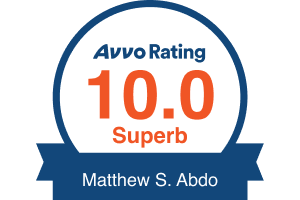Michigan Drinking and Driving
DUI Tests: Testing for Alcohol, Drugs Michigan Implied Consent Law, Refusals
When a person is suspected of operating a motor vehicle under the influence or drugs, the police may obtain a breath, blood or urine sample to determine the presence and extent (levels) of alcohol or drugs present in the person’s body. Criminal charges for operating while intoxicated or under the influence are based upon the test results.
If the test is properly administered, the results are admissible in a DUI trial. The testing process, test equipment and results are always subject to a attack at trial.
Just because the police have test results in their favor does not mean that a case is lost. ABDO LAW will advise you on the best course of action and how we can fight a DUI and succeeded in getting the charges reduced to lower offenses even in scenarios where the test scores are reliable and exceed the legal limit. We handle DUI Drug Offenses and DUI Alcohol Offenses in every Metro Detroit court in the counties of Macomb, Oakland, St. Clair and Wayne.
CALL: Metro Detroit: 586-412-5555
Measuring Alcohol: Bodily Alcohol Content (BAC)
BAC refers to the ratio of alcohol to blood in the bloodstream. Michigan has set limits for certain offenses involving alcohol. Those limits, or cut-offs, apply to the following cases.
- Zero Tolerance: A person under age 21 with a BAC of .02 to .07 may be charged with a Zero Tolerance drinking and driving violation.
- Operating While Intoxicated (OWI): A BAC of .08% is considered legally drunk which will support a drunk driving charge (often abbreviated as DUI or OWI).
- Super Drunk Driving: A BAC of .17 or greater will support a charge known as “High BAC OWI” or “Super Drunk”.
Alcohol Absorption, Distribution and Elimination
One of the initial steps in any drinking and driving case handled by ABDO LAW is to determine whether the chemical test is accurate and was administered according to Michigan law. Several factors determine a person’s Blood Alcohol Content (BAC) including the number of drinks consumed, lapse of time, metabolism and body weight.
Alcohol absorption is the passage of alcohol into the blood. Generally, the more a person weighs, the larger the volume of body mass and the lower the BAC obtained from the consumption of a given amount of alcohol. Elimination is the removal of alcohol from the body. Elimination occurs at a constant rate for a given individual. Most people eliminate alcohol at the rate of 13 and 18 mg% per hour.
Driving Under the Influence of Drugs, Prescribed Drugs, Marijuana
Intoxication, impairment or under the influence may occur due to the consumption of alcohol, marijuana (including medical marijuana) illegal drugs, prescribed medications or a combination of alcohol and drugs. When drugs or marijuana are suspected, the police will seek a blood sample of the driver for testing. Should an individual refuse to take a test, the police can obtain a search warrant for a blood test. All testing, including blood testing is subject to ridged standards of care which are the subject of attack at trial. When a person is tested for prescribed medications, the defense may call witnesses to testify as to the person’s sobriety or normal behavior before operating a vehicle. When marijuana is the drug that is found, we may assert that the THC levels do not indicate recent usage or that the results are below standards to be considered “under the influence”. In Colorado, the DUI legal limit has been set at 5 nanograms of THC. Michigan not adopted a threshold legal limit for marijuana but legislation is likely to change with the expected passage of recreational marijuana laws.
Right to a Second Test of Your Own Choice
A person has a right to request a second test of his or her choice, and at his or her own out-of-pocket cost, provided that the person takes the test first offered by the police.
Warrant for Blood Test, Sample Available to Defense for Independent Lab Testing
In Michigan, upon refusal, the police may obtain a warrant for a blood sample to test for alcohol, marijuana, illegal drugs or prescribed drugs. Blood samples for blood alcohol content (BAC) are typically based upon blood serum. Alcohol levels based upon blood serum testing tend to be higher than samples of whole blood. This can be misleading. When the police obtain a blood sample, they are required to obtain 2 vials. The second vial is available for independent testing should our defense team have any doubts as the test result or testing procedure utilized by law enforcement officers.
Implied Consent Law: Failure to Submit to Testing
Pursuant to Michigan’s Implied Consent Law, a person that is suspected of an offense for operating under the influence is required to take a chemical test to determine the presence of alcohol or drugs. Breath tests are typically used to determine a person’s blood alcohol content (BAC). Blood tests are the preferred method of testing for drugs. Under Michigan’s Implied Consent Law, all drivers are considered to have given their consent to provide a breath, blood or urine sample or face Secretary of State sanctions upon refusal.
Refusals of Chemical Test, Administrative Hearing, License Sanctions
A refusal of a chemical test will be reported to the Driver License Appeal Division (DLAD) by the reporting law enforcement officer associated with the underlying drunk driving case. A party that contests the refusal is required to request an administrative hearing within 14 days. ABDO LAW always recommends that the request for hearing be filed in every refusal situation.
Request for Hearing Form and hearing issues: At the implied consent hearing, the law enforcement/police officer will be required to establish compliance with the Secretary of State rules for administering a chemical test and that the person unreasonably refused the test. A person who loses the hearing, fails to request a hearing, or fails to appear for the hearing, faces mandatory sanctions of six (6) points and one (1) year license suspension. A second implied consent suspension within seven (7) years will require six (6) points and two (2) years license suspension with limited right to appeal the suspension.
Technical Refusal of Breath Test
The police officer may charge a party with a refusal under circumstances when a party is not fully cooperating to give a sample. This frequently occurs when a person is asked to provide a breath sample. The breath test (Data-Master) operates to measure the alcohol vapor which is expelled from the blood through the lungs when a person exhales. A technical refusal occurs when a person fails to provide an adequate sample. This is done when the person tries to defeat the test by giving a “side air blow” or blows softy into the ampoule or straw. Arguments can be made at the implied consent hearing when a person has a breathing disorder or suffered injuries which made testing difficult.
Appeals to the Circuit Court after Losing Implied Consent Hearing
As I explained, the issue regarding a chemical test refusal is first heard by a Secretary of State administrative hearing officer. When a party loses an administrative hearing pertaining to the implied consent law, he or she may appeal the matter to the circuit court in the county where the offense occurred.
License appeals can be based upon the grounds of hardship (necessity) or on the merits (a flaw in the hearing officer’s decision). Hardship or necessity means that the person needs a license for employment or education and does not have a mass transit system or person within the household to provide transportation. The court may grant a restricted license (for employment, education) to an applicant who prevails in an appeal based upon hardship/necessity. Contact ABDO LAW if you find yourself in this position.
DUI Defense Lawyers: Email or Call for Free Consultation
Macomb County, Oakland County, Wayne County & St. Clair County
EMAIL or CALL Abdo Law for a FREE CONSULTATION. Phone messages after business hours are forwarded to our attorneys. We offer same day, evening, weekend appointments and the ability to retain us over the internet. Payment plans and all credit cards accepted.
CALL: Metro Detroit: 586-412-5555




















